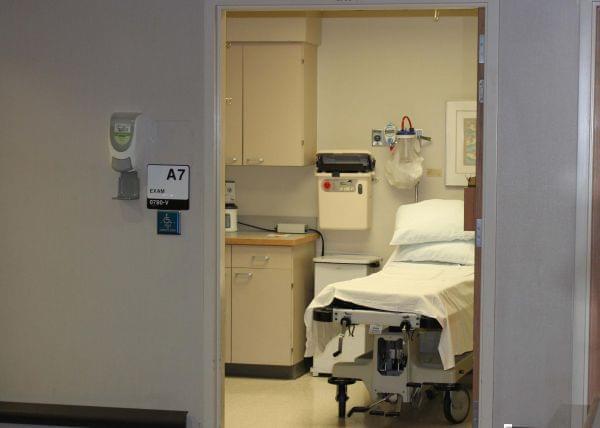Democrats Tout Medicare Plans In Iowa, As Caucuses Near

Health care, and how to pay for it, is a major topic this campaign season as Iowans' per capita spending on health care is sharply increasing. Lindsey Moon/Iowa Public Radio
For months, Democratic presidential candidates have been swarming Iowa, seeking support for the caucuses on February 3. Healthcare -- and how to pay for it -- is one of the biggest issues for voters.
More than half of the state’s hospitals are operating in the red, while per capita spending on health care is rising sharply. So what are the candidates proposing when it comes to Medicare?
Jim Atty is watching the candidates’ proposals — particularly on Medicare. He’s CEO of the hospital in Waverly, a small town in northeast Iowa. He worries that if Medicare changes, the government won’t pay the hospital enough to cover its costs.
"We do think that it would lower reimbursements," he said. "We do think that it has the potential to not bridge the gap of uninsured or underinsured to the extent that I think is being proposed."
Iowa already has one of lowest Medicare reimbursement rates in the country. Atty said 50 percent of Waverly’s patients are on Medicare. If more Iowans use it under those rates, rural hospitals like his might have to cut services, like labor and delivery units, to balance the books.

Jim Atty, the CEO of the Waverly Health Center, says he's concerned that his hospital could face more financial pressure if the Medicare system is expanded under the current reimbursement rates.
"We can't really afford more uninsured and underinsured in the state," he said.
But in the campaign, expanding Medicare has been at the heart of many candidates’ proposals, and it’s on the minds of many Iowans like Atty.
On one side are Vermont Sen. Bernie Sanders and Massachusetts Sen. Elizabeth Warren. They want everyone on a government-run system like Medicare, which right now is mostly for people over 65. They say eliminating private health insurance would save a lot on administrative costs.
"The function of the current health care system is not to provide quality care for all in a cost effective way. The function of the current system is to make billions of dollars in profits for the insurance companies and the drug companies," Sanders said at a CNN Town Hall earlier this year.
In the other category are candidates like Pete Buttigieg, the mayor of South Bend, Ind. He has a plan called Medicare for all who want it. It would extend Medicare to the general public but keep private health insurance so people have a choice.
"I just don’t think it’s a good idea to command Americans to adopt Medicare for all whether they want it or not. Under my plan, if you prefer to keep your private insurance, you can," Buttigieg said on CNN last month.
Candidates with similar plans include Minnesota Sen. Amy Klobuchar, former Texas Rep. Beto O’Rourke, and former Vice President Joe Biden.
Iowans have mixed feelings about these plans and who they want to support.
At a mental health forum at Drake University, Indianola resident Esther Kauffeld-Hoffa likes Warren and her Medicare for all proposal.
"I think the costs will actually go down," she said. "People are starting to not be able to afford their health care that they get through work. It's gotten so expensive."
But Cedar Rapids resident Synona Culbertson is leaning towards candidates who would give people more choice.
"I think people that have private insurance that like their private insurance should be able to keep that," she said.
According to a Des Moines Register poll last month, 41 percent of likely caucus-goers support Medicare for all, and 24 percent think it’s a bad policy.
Barb Kniff-McCulla owns a small construction company in Pella, about an hour east of Des Moines. She’s afraid any plan that expands Medicare could mean an increase in her payroll taxes to fund it.
"I think our costs would go through the roof, they would skyrocket. And how are we going to pay for this?" Kniff-McCulla said.
That’s why she supports President Donald Trump. He opposes the Democrats' proposals to expand public insurance.
Peter Damiano, director of the University of Iowa Public Policy Center, says voters need to remember that the candidates’ plans still lack many critical details, like that will happen with reimbursement rates.
"What you're hearing from the candidates is really an indication of what their priorities are, what they're feeling people want to be hearing about in their position," he said. "So you can get a sense as someone who in general views the world as I do."
Damiano says something else to remember is that if a Democrat does make it into the White House, any proposed plan will need to pass through Congress.
This story was produced by Side Effects Public Media, a news collaborative covering public health.
Links
- Capping The Cost Of Insulin; Hate Incidents At The U of I; Election Security; Chicago Red Stars Reach Finals
- ‘The Price We Pay’ And The Increasing Cost Of Health Care; Paternity Leave And Life Satisfaction
- Illinois Lawmaker Is Optimistic New EpiPen Law Will Lower Costs, Despite Critics’ Concerns
- Rate And Cost of Alzheimer’s Disease Expected To Grow
